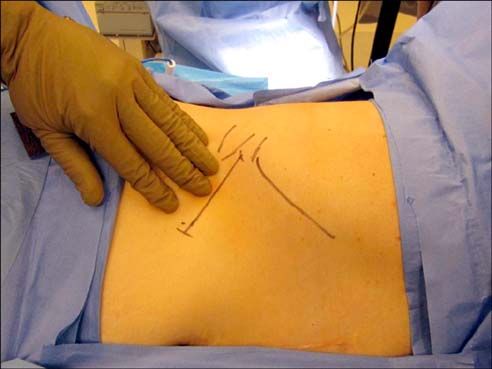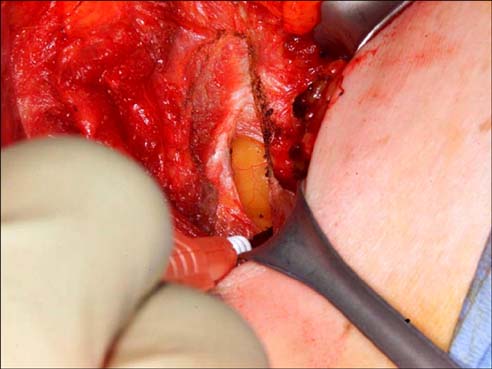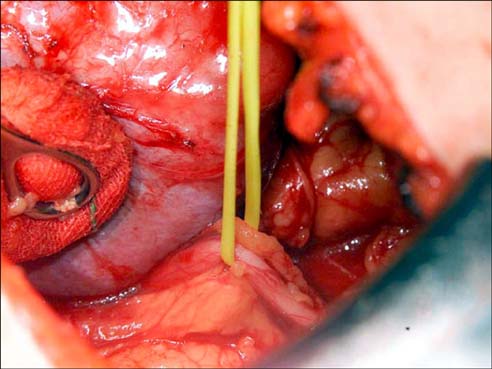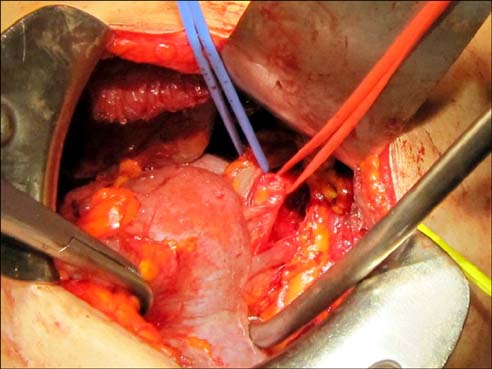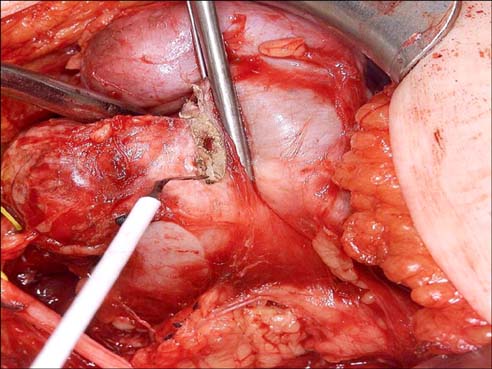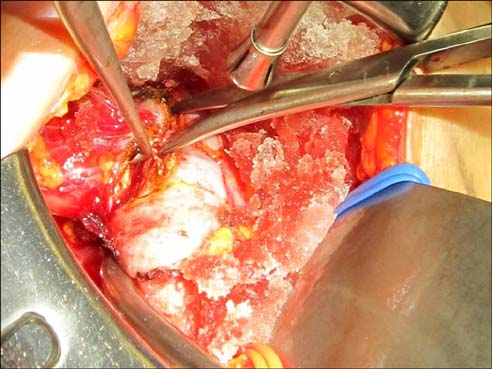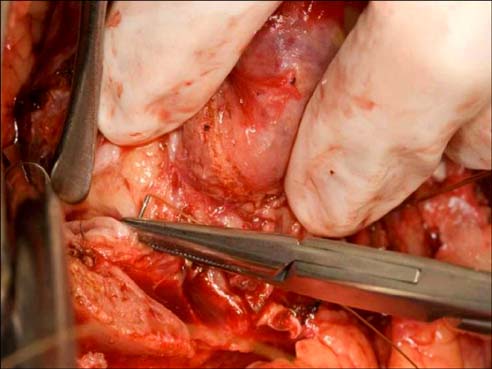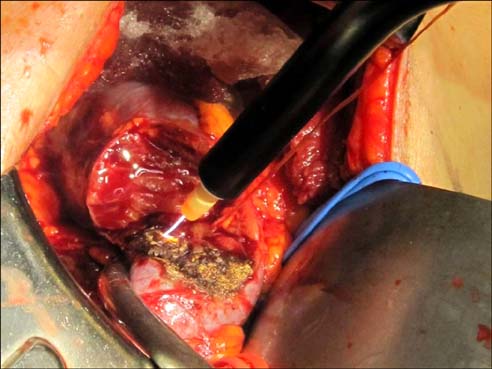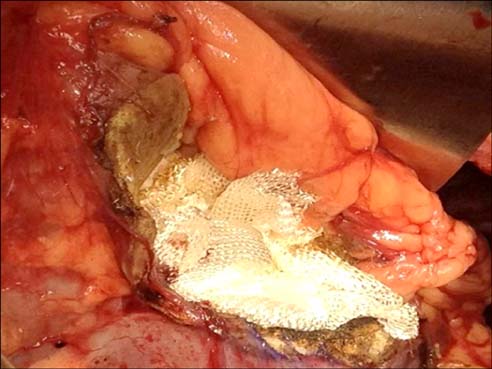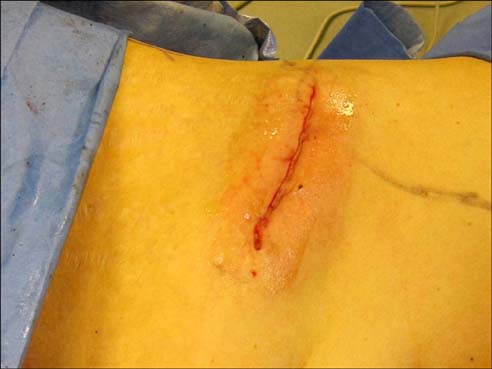Korean J Urol.
2014 Sep;55(9):557-567. 10.4111/kju.2014.55.9.557.
Open Mini-Flank Partial Nephrectomy: An Essential Contemporary Operation
- Affiliations
-
- 1Urology Service, Department of Surgery, Memorial Sloan Kettering Cancer Center, New York, NY, USA. RussoP@MSKCC.org
- KMID: 2069772
- DOI: http://doi.org/10.4111/kju.2014.55.9.557
Abstract
- Secondary to the widespread use of the modern imaging techniques of computed tomography, magnetic resonance imaging, and ultrasound, 70% of renal tumors today are detected incidentally with a median tumor size of less than 4 cm. Twenty years ago, all renal tumors, regardless of size were treated with radical nephrectomy (RN). Elective partial nephrectomy (PN) has emerged as the treatment of choice for small renal tumors. The basis of this paradigm shift is three major factors: (1) cancer specific survival is equivalent for T1 tumors (7 cm or less) whether treated by PN or RN; (2) approximately 45% of renal tumors have indolent or benign pathology; and (3) PN prevents or delays the onset of chronic kidney disease, a condition associated with increased cardiovascular morbidity and mortality. Although PN can be technically demanding and associated with potential complications of bleeding, infection, and urinary fistula, the patient derived benefits of this operation far outweigh the risks. We have developed a "mini-flank" open surgical approach that is highly effective and, coupled with rapid recovery postoperative care pathways associated with a 2-day length of hospital stay.
Keyword
MeSH Terms
Figure
Reference
-
1. Beare JB, McDonald JR. Involvement of the renal capsule in surgically removed hyper-nephroma; a gross and histopathologic study. J Urol. 1949; 61:857–861.2. Mortensen H. Transthoracic nephrectomy. J Urol. 1948; 60:855–858.3. Robson CJ. Radical nephrectomy for renal cell carcinoma. J Urol. 1963; 89:37–42.4. Robson CJ, Churchill BM, Anderson W. The results of radical nephrectomy for renal cell carcinoma. J Urol. 1969; 101:297–301.5. Skinner DG, Colvin RB, Vermillion CD, Pfister RC, Leadbetter WF. Diagnosis and management of renal cell carcinoma. A clinical and pathologic study of 309 cases. Cancer. 1971; 28:1165–1177.6. Patel NP, Lavengood RW. Renal cell carcinoma: natural history and results of treatment. J Urol. 1978; 119:722–726.7. Sagalowsky AI, Kadesky KT, Ewalt DM, Kennedy TJ. Factors influencing adrenal metastasis in renal cell carcinoma. J Urol. 1994; 151:1181–1184.8. Herrlinger A, Schrott KM, Schott G, Sigel A. What are the benefits of extended dissection of the regional renal lymph nodes in the therapy of renal cell carcinoma. J Urol. 1991; 146:1224–1227.9. Ditonno P, Traficante A, Battaglia M, Grossi FS, Selvaggi FP. Role of lymphadenectomy in renal cell carcinoma. Prog Clin Biol Res. 1992; 378:169–174.10. Robson CJ. Results of radical thoraco-abdominal nephrectomy in the treatment of renal cell carcinoma. Prog Clin Biol Res. 1982; 100:481–488.11. Russo P. Open radical nephrectomy for localized renal cell carcinoma. In : Vogelzang , Nicholas J, editors. Genitourinary oncology. 3rd ed. Philadelphia: Lippincott Williams and Wilkins;2006. p. 725–731.12. Herr HW. A history of partial nephrectomy for renal tumors. J Urol. 2005; 173:705–708.13. Herr HW. Surgical management of renal tumors: a historical perspective. Urol Clin North Am. 2008; 35:543–549. v.14. Boyce WH, Elkins IB. Reconstructive renal surgery following anatrophic nephrolithotomy: followup of 100 consecutive cases. J Urol. 1974; 111:307–312.15. Brodel M. The intrinsic blood vessels of the kidney and their significance in nephrotomy. Johns Hopkins Hosp Bull. 1901; 12:10–13.16. Woodhouse CR, Farrell CR, Paris AM, Blandy JP. The place of extended pyelolithotomy (Gil-Vernet Operation) in the management of renal staghorn calculi. Br J Urol. 1981; 53:520–523.17. McAninch JW, Carroll PR. Renal exploration after trauma. Indications and reconstructive techniques. Urol Clin North Am. 1989; 16:203–212.18. Russo P. The role of surgery in the management of early-stage renal cancer. Hematol Oncol Clin North Am. 2011; 25:737–752.19. Licht MR, Novick AC. Nephron sparing surgery for renal cell carcinoma. J Urol. 1993; 149:1–7.20. Herr HW. Partial nephrectomy for unilateral renal carcinoma and a normal contralateral kidney: 10-year followup. J Urol. 1999; 161:33–34.21. Fergany AF, Hafez KS, Novick AC. Long-term results of nephron sparing surgery for localized renal cell carcinoma: 10-year followup. J Urol. 2000; 163:442–445.22. Gilbert BR, Russo P, Zirinsky K, Kazam E, Fair WR, Vaughan ED Jr. Intraoperative sonography: application in renal cell carcinoma. J Urol. 1988; 139:582–584.23. Uzzo RG, Novick AC. Nephron sparing surgery for renal tumors: indications, techniques and outcomes. J Urol. 2001; 166:6–18.24. Russo P, Huang W. The medical and oncological rationale for partial nephrectomy for the treatment of T1 renal cortical tumors. Urol Clin North Am. 2008; 35:635–643.25. Lee CT, Katz J, Shi W, Thaler HT, Reuter VE, Russo P. Surgical management of renal tumors 4 cm or less in a contemporary cohort. J Urol. 2000; 163:730–736.26. Lesage K, Joniau S, Fransis K, Van Poppel H. Comparison between open partial and radical nephrectomy for renal tumours: perioperative outcome and health-related quality of life. Eur Urol. 2007; 51:614–620.27. Russo P, Goetzl M, Simmons R, Katz J, Motzer R, Reuter V. Partial nephrectomy: the rationale for expanding the indications. Ann Surg Oncol. 2002; 9:680–687.28. Leibovich BC, Blute M, Cheville JC, Lohse CM, Weaver AL, Zincke H. Nephron sparing surgery for appropriately selected renal cell carcinoma between 4 and 7 cm results in outcome similar to radical nephrectomy. J Urol. 2004; 171:1066–1070.29. Dash A, Vickers AJ, Schachter LR, Bach AM, Snyder ME, Russo P. Comparison of outcomes in elective partial vs radical nephrectomy for clear cell renal cell carcinoma of 4-7 cm. BJU Int. 2006; 97:939–945.30. Pahernik S, Roos F, Rohrig B, Wiesner C, Thuroff JW. Elective nephron sparing surgery for renal cell carcinoma larger than 4 cm. J Urol. 2008; 179:71–74.31. Thompson RH, Siddiqui S, Lohse CM, Leibovich BC, Russo P, Blute ML. Partial versus radical nephrectomy for 4 to 7 cm renal cortical tumors. J Urol. 2009; 182:2601–2606.32. Karellas ME, O'Brien MF, Jang TL, Bernstein M, Russo P. Partial nephrectomy for selected renal cortical tumours of ≥ 7 cm. BJU Int. 2010; 106:1484–1487.33. Breau RH, Crispen PL, Jimenez RE, Lohse CM, Blute ML, Leibovich BC. Outcome of stage T2 or greater renal cell cancer treated with partial nephrectomy. J Urol. 2010; 183:903–908.34. Segev DL, Muzaale AD, Caffo BS, Mehta SH, Singer AL, Taranto SE, et al. Perioperative mortality and long-term survival following live kidney donation. JAMA. 2010; 303:959–966.35. Fehrman-Ekholm I, Duner F, Brink B, Tyden G, Elinder CG. No evidence of accelerated loss of kidney function in living kidney donors: results from a cross-sectional follow-up. Transplantation. 2001; 72:444–449.36. Goldfarb DA, Matin SF, Braun WE, Schreiber MJ, Mastroianni B, Papajcik D, et al. Renal outcome 25 years after donor nephrectomy. J Urol. 2001; 166:2043–2047.37. Kaplan C, Pasternack B, Shah H, Gallo G. Age-related incidence of sclerotic glomeruli in human kidneys. Am J Pathol. 1975; 80:227–234.38. Lau WK, Blute ML, Weaver AL, Torres VE, Zincke H. Matched comparison of radical nephrectomy vs nephron-sparing surgery in patients with unilateral renal cell carcinoma and a normal contralateral kidney. Mayo Clin Proc. 2000; 75:1236–1242.39. McKiernan J, Simmons R, Katz J, Russo P. Natural history of chronic renal insufficiency after partial and radical nephrectomy. Urology. 2002; 59:816–820.40. Sarnak MJ, Levey AS, Schoolwerth AC, Coresh J, Culleton B, Hamm LL, et al. Kidney disease as a risk factor for development of cardiovascular disease: a statement from the American Heart Association Councils on Kidney in Cardiovascular Disease, High Blood Pressure Research, Clinical Cardiology, and Epidemiology and Prevention. Circulation. 2003; 108:2154–2169.41. Coresh J, Selvin E, Stevens LA, Manzi J, Kusek JW, Eggers P, et al. Prevalence of chronic kidney disease in the United States. JAMA. 2007; 298:2038–2047.42. Go AS, Chertow GM, Fan D, McCulloch CE, Hsu CY. Chronic kidney disease and the risks of death, cardiovascular events, and hospitalization. N Engl J Med. 2004; 351:1296–1305.43. Stevens LA, Coresh J, Greene T, Levey AS. Assessing kidney function-measured and estimated glomerular filtration rate. N Engl J Med. 2006; 354:2473–2483.44. Huang WC, Levey AS, Serio AM, Snyder M, Vickers AJ, Raj GV, et al. Chronic kidney disease after nephrectomy in patients with renal cortical tumours: a retrospective cohort study. Lancet Oncol. 2006; 7:735–740.45. Thompson RH, Boorjian SA, Lohse CM, Leibovich BC, Kwon ED, Cheville JC, et al. Radical nephrectomy for pT1a renal masses may be associated with decreased overall survival compared with partial nephrectomy. J Urol. 2008; 179:468–471.46. Huang WC, Elkin EB, Levey AS, Jang TL, Russo P. Partial nephrectomy versus radical nephrectomy in patients with small renal tumors: is there a difference in mortality and cardiovascular outcomes? J Urol. 2009; 181:55–61.47. Tan HJ, Norton EC, Ye Z, Hafez KS, Gore JL, Miller DC. Long-term survival following partial vs radical nephrectomy among older patients with early-stage kidney cancer. JAMA. 2012; 307:1629–1635.48. Kim SP, Thompson RH, Boorjian SA, Weight CJ, Han LC, Murad MH, et al. Comparative effectiveness for survival and renal function of partial and radical nephrectomy for localized renal tumors: a systematic review and meta-analysis. J Urol. 2012; 188:51–57.49. Campbell SC, Novick AC, Belldegrun A, Blute ML, Chow GK, Derweesh IH, et al. Guideline for management of the clinical T1 renal mass. J Urol. 2009; 182:1271–1279.50. Hollenbeck BK, Taub DA, Miller DC, Dunn RL, Wei JT. National utilization trends of partial nephrectomy for renal cell carcinoma: a case of underutilization? Urology. 2006; 67:254–259.51. Miller DC, Hollingsworth JM, Hafez KS, Daignault S, Hollenbeck BK. Partial nephrectomy for small renal masses: an emerging quality of care concern? J Urol. 2006; 175(3 Pt 1):853–857.52. Dulabon LM, Lowrance WT, Russo P, Huang WC. Trends in renal tumor surgery delivery within the United States. Cancer. 2010; 116:2316–2321.53. Ljungberg B, Cowan NC, Hanbury DC, Hora M, Kuczyk MA, Merseburger AS, et al. EAU guidelines on renal cell carcinoma: the 2010 update. Eur Urol. 2010; 58:398–406.54. Kopka L, Fischer U, Zoeller G, Schmidt C, Ringert RH, Grabbe E. Dual-phase helical CT of the kidney: value of the corticomedullary and nephrographic phase for evaluation of renal lesions and preoperative staging of renal cell carcinoma. AJR Am J Roentgenol. 1997; 169:1573–1578.55. Raj GV, Bach AM, Iasonos A, Korets R, Blitstein J, Hann L, et al. Predicting the histology of renal masses using preoperative Doppler ultrasonography. J Urol. 2007; 177:53–58.56. Dechet CB, Zincke H, Sebo TJ, King BF, LeRoy AJ, Farrow GM, et al. Prospective analysis of computerized tomography and needle biopsy with permanent sectioning to determine the nature of solid renal masses in adults. J Urol. 2003; 169:71–74.57. Volpe A, Finelli A, Gill IS, Jewett MA, Martignoni G, Polascik TJ, et al. Rationale for percutaneous biopsy and histologic characterisation of renal tumours. Eur Urol. 2012; 62:491–504.58. Galvin DJ, Savage CJ, Adamy A, Kaag M, O'Brien MF, Kallingal G, et al. Intraoperative conversion from partial to radical nephrectomy at a single institution from 2003 to 2008. J Urol. 2011; 185:1204–1209.59. Raj GV, Thompson RH, Leibovich BC, Blute ML, Russo P, Kattan MW. Preoperative nomogram predicting 12-year probability of metastatic renal cancer. J Urol. 2008; 179:2146–2151.60. Kutikov A, Uzzo RG. The R.E.N.A.L. nephrometry score: a comprehensive standardized system for quantitating renal tumor size, location and depth. J Urol. 2009; 182:844–853.61. Lane BR, Abouassaly R, Gao T, Weight CJ, Hernandez AV, Larson BT, et al. Active treatment of localized renal tumors may not impact overall survival in patients aged 75 years or older. Cancer. 2010; 116:3119–3126.62. Jewett MA, Zuniga A. Renal tumor natural history: the rationale and role for active surveillance. Urol Clin North Am. 2008; 35:627–634.63. Chatterjee S, Nam R, Fleshner N, Klotz L. Permanent flank bulge is a consequence of flank incision for radical nephrectomy in one half of patients. Urol Oncol. 2004; 22:36–39.64. Diblasio CJ, Snyder ME, Russo P. Mini-flank supra-11th rib incision for open partial or radical nephrectomy. BJU Int. 2006; 97:149–156.65. Huang WC, Kagiwada MA, Russo P. Surgery insight: advances in techniques for open partial nephrectomy. Nat Clin Pract Urol. 2007; 4:444–450.66. Tarin T, Feifer A, Kimm S, Chen L, Sjoberg D, Coleman J, et al. Impact of a common clinical pathway on length of hospital stay in patients undergoing open and minimally invasive kidney surgery. J Urol. 2014; 191:1225–1230.67. Patel MI, Simmons R, Kattan MW, Motzer RJ, Reuter VE, Russo P. Long-term follow-up of bilateral sporadic renal tumors. Urology. 2003; 61:921–925.68. Lowrance WT, Yee DS, Maschino AC, Cronin AM, Bernstein M, Thompson RH, et al. Developments in the surgical management of sporadic synchronous bilateral renal tumours. BJU Int. 2010; 105:1093–1097.69. Coleman JA, Russo P. Hereditary and familial kidney cancer. Curr Opin Urol. 2009; 19:478–485.70. Richstone L, Scherr DS, Reuter VR, Snyder ME, Rabbani F, Kattan MW, et al. Multifocal renal cortical tumors: frequency, associated clinicopathological features and impact on survival. J Urol. 2004; 171(2 Pt 1):615–620.71. Kattan MW, Reuter V, Motzer RJ, Katz J, Russo P. A postoperative prognostic nomogram for renal cell carcinoma. J Urol. 2001; 166:63–67.72. Adamy A, Lowrance WT, Yee DS, Chong KT, Bernstein M, Tickoo SK, et al. Renal oncocytosis: management and clinical outcomes. J Urol. 2011; 185:795–801.73. Lane BR, Russo P, Uzzo RG, Hernandez AV, Boorjian SA, Thompson RH, et al. Comparison of cold and warm ischemia during partial nephrectomy in 660 solitary kidneys reveals predominant role of nonmodifiable factors in determining ultimate renal function. J Urol. 2011; 185:421–427.74. Yossepowitch O, Thompson RH, Leibovich BC, Eggener SE, Pettus JA, Kwon ED, et al. Positive surgical margins at partial nephrectomy: predictors and oncological outcomes. J Urol. 2008; 179:2158–2163.75. Ghavamian R, Cheville JC, Lohse CM, Weaver AL, Zincke H, Blute ML. Renal cell carcinoma in the solitary kidney: an analysis of complications and outcome after nephron sparing surgery. J Urol. 2002; 168:454–459.76. Saranchuk JW, Touijer AK, Hakimian P, Snyder ME, Russo P. Partial nephrectomy for patients with a solitary kidney: the Memorial Sloan-Kettering experience. BJU Int. 2004; 94:1323–1328.77. Ching CB, Lane BR, Campbell SC, Li J, Fergany AF. Five to 10-year followup of open partial nephrectomy in a solitary kidney. J Urol. 2013; 190:470–474.78. Feifer A, Savage C, Rayala H, Lowrance W, Gotto G, Sprenkle P, et al. Prognostic impact of muscular venous branch invasion in localized renal cell carcinoma cases. J Urol. 2011; 185:37–42.79. Verhoest G, Avakian R, Bensalah K, Thuret R, Ficarra V, Artibani W, et al. Urinary collecting system invasion is an independent prognostic factor of organ confined renal cell carcinoma. J Urol. 2009; 182:854–859.80. Johnson A, Sudarshan S, Liu J, Linehan WM, Pinto PA, Bratslavsky G. Feasibility and outcomes of repeat partial nephrectomy. J Urol. 2008; 180:89–93.81. Nguyen CT, Lane BR, Kaouk JH, Hegarty N, Gill IS, Novick AC, et al. Surgical salvage of renal cell carcinoma recurrence after thermal ablative therapy. J Urol. 2008; 180:104–109.82. Kowalczyk KJ, Hooper HB, Linehan WM, Pinto PA, Wood BJ, Bratslavsky G. Partial nephrectomy after previous radio frequency ablation: the National Cancer Institute experience. J Urol. 2009; 182:2158–2163.83. Krishnamurthi V, Novick AC, Bukowski R. Nephron sparing surgery in patients with metastatic renal cell carcinoma. J Urol. 1996; 156:36–39.84. Russo P. Multi-modal treatment for metastatic renal cancer: the role of surgery. World J Urol. 2010; 28:295–301.85. Thomas AA, Rini BI, Stephenson AJ, Garcia JA, Fergany A, Krishnamurthi V, et al. Surgical resection of renal cell carcinoma after targeted therapy. J Urol. 2009; 182:881–886.86. Stephenson AJ, Hakimi AA, Snyder ME, Russo P. Complications of radical and partial nephrectomy in a large contemporary cohort. J Urol. 2004; 171:130–134.87. Meeks JJ, Zhao LC, Navai N, Perry KT Jr, Nadler RB, Smith ND. Risk factors and management of urine leaks after partial nephrectomy. J Urol. 2008; 180:2375–2378.88. Kundu SD, Thompson RH, Kallingal GJ, Cambareri G, Russo P. Urinary fistulae after partial nephrectomy. BJU Int. 2010; 106:1042–1044.89. Sanchez-Ortiz R, Madsen LT, Swanson DA, Canfield SE, Wood CG. Closed suction or penrose drainage after partial nephrectomy: does it matter? J Urol. 2004; 171:244–246.90. Godoy G, Katz DJ, Adamy A, Jamal JE, Bernstein M, Russo P. Routine drain placement after partial nephrectomy is not always necessary. J Urol. 2011; 186:411–415.91. Ghoneim TP, Thornton RH, Solomon SB, Adamy A, Favaretto RL, Russo P. Selective arterial embolization for pseudoaneurysms and arteriovenous fistula of renal artery branches following partial nephrectomy. J Urol. 2011; 185:2061–2065.92. Donat SM, Diaz M, Bishoff JT, Coleman JA, Dahm P, Derweesh IH, et al. Follow-up for Clinically Localized Renal Neoplasms: AUA Guideline. J Urol. 2013; 190:407–416.
- Full Text Links
- Actions
-
Cited
- CITED
-
- Close
- Share
- Similar articles
-
- Experience with Arteriovenous Malformation: A Report of One Case
- Comparison of transperitoneal and retroperitoneal robot partial nephrectomy for kidney tumors
- Current Status of Partial Nephrectomy for Renal Mass
- Open Partial Nephrectomy With Zero IschemiaTechnique Using Thulium Laser: Our Experience of4 Cases
- Laparoscopic Partial Nephrectomy using a Microwave Tissue Coagulator for Small Renal Tumor

